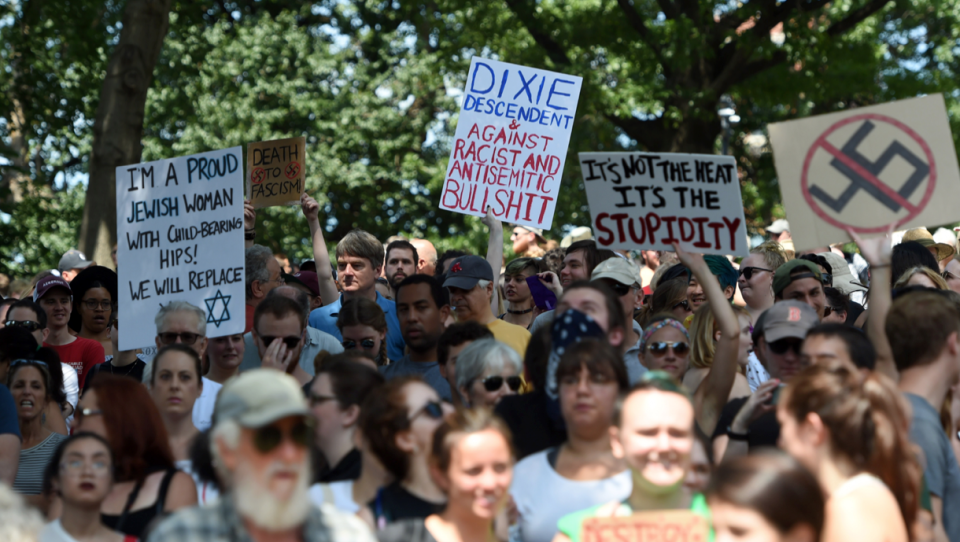There’s been so much written and said about free speech and the lack thereof at Saturday’s rally on the Boston Common that the big picture is in danger of being lost. So let me try to bring it back into focus. An estimated 30,000 to 40,000 people turned out not to protest what a few right-wingers had to say or to rumble with the police. Rather, they came to express their anger and disgust with President Trump.
Lest we forget, back in May a similar event drew just a few hundred people, with the two sides being kept apart by police officers. We might have seen a similar response this past weekend. But then a motley band of white supremacists and neo-Nazis marched in Charlottesville, Virginia. A fellow-traveler was accused of driving into a crowd of people who had come to protest against such hate, killing one of them, Heather Heyer. And Trump, on his third attempt to address what had happened, threw a temper tantrum of a news conference in which he placed racists and those who oppose racism on the same moral plane.
It was that reality that was on the minds of those who showed up at the Reggie Lewis Center in Roxbury on Saturday morning. I was among them, carrying a notebook and a smartphone with handmade press credentials around my neck so no one would think I was one of the protesters. The crowd reminded me of the folks who’d turned out in Copley Square last January to protest Trump’s first, botched Muslim ban: earnest liberals from the suburbs, Black Lives Matter activists, young people, LGBTQ people, lots of racial diversity, lots of ink (not visible last winter), and a large number of clergy. Mayor Marty Walsh, Police Commissioner Bill Evans, and Attorney General Maura Healey all put in appearances on Saturday.
There were, of course, a few political radicals on hand. Two older women who would only give me their first names held up a large banner that said “No Free Speech for Fascists” — and, in smaller type, “Progressive Labor Party,” a far-left group. I asked them if they thought their views contradicted the First Amendment’s guarantee of free speech. “There is no free speech,” Ruth instructed me. “Speech costs a lot of money.” Added Heidi: “We need to stop this hate speech.”
More typical was a young African-American woman named Bonita Yarboro of Hamden, Connecticut, who was holding a green sign that read “I am Black and I MATTER. Any questions?” I asked her what had brought her to Boston and what her hopes were for the counter-protest, dubbed “Fight Supremacy” by its organizers. “Four of us came up together in a Volkswagen Beetle,” she said. “I just want to stand up against racism, anti-Semitism, every -ism out there.”
We got under way a little before 11. The march down Tremont Street toward the Boston Common was a rolling celebration. The police officers who lined the route were professional and friendly. Charlie Pierce wrote in Esquire that Police Superintendent Willie Gross was posing for selfies with marchers.
By 1, with our destination still ahead of us, word started to ripple through the crowd that the rally was over and that the right-wing speakers had left. With the Common just ahead of me, I spotted state Rep. Byron Rushing, a South End Democrat, who told me he’d been prohibited from entering the 75-yard zone around the Parkman Bandstand that police had set up to protect the speakers. “I came down to hear them, and they wouldn’t let me in,” he said. “Freedom of speech should be reciprocal. If they can talk, I should be able to listen.”
In fact, there remain some legitimate concerns about how the authorities handled access to the bandstand. The police department had a genuine public-safety challenge on its hands, and the buffer zone was probably a necessity — but it wouldn’t have been as onerous if, say, a few pool reporters had been allowed in to hear what the speakers had to say. It didn’t help that Commissioner Evans issued a statement in which he said it was “a good thing” that the right-wingers couldn’t get their message out. The ACLU and others have expressed concern.
But the triumph of the counter-protest was not that it had silenced a few extremists (and it’s not even clear how extreme they were, given that some who had been scheduled didn’t show up). The triumph was that the crowd had expressed its opposition to the racism and hatred that these days is indulged, even amplified, by the president of the United States. I couldn’t help but feel a surge of patriotism in the face of such idealism.
Trump’s outrages come at us every day. But his sociopathic reaction to the events in Charlottesville seems like a watershed moment of the sort that greeted the “Access Hollywood” tape, on which he was heard profanely bragging about groping and sexually assaulting women. From business leaders to Republican officials, a new wave of people has begun moving away from him. Republican Sen. Bob Corker of Tennessee, presidential historian Douglas Brinkley, and investigative reporting legend Carl Bernstein are among the serious, careful folks who recently have questioned Trump’s mental stability. (Brinkley and Bernstein made their remarks on CNN.)
This can’t go on, but how will it end? Regardless of what comes next, I’m proud of my city for the stand it took this past weekend.




